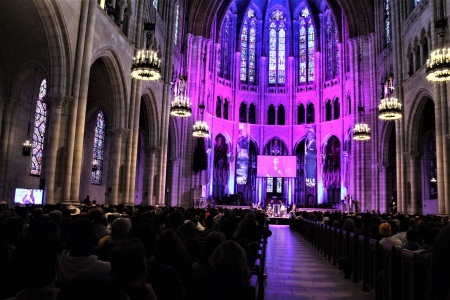Black church fund project gets $20M on MLK Day

As many churches struggle to stay open amid the COVID-19 pandemic with dwindling membership and finances, The National Trust for Historic Preservation's African American Cultural Heritage Action Fund received a $20 million gift on Monday to help preserve the legacy of the black church in America.
"The centerpiece of Black communities starts with the Black church," Brent Leggs, senior vice president and executive director of the fund told ABC News in an interview. "Black churches are exceptionally important in American democracy, not only for their legacy in civil and human rights, but also for their role in uplifting civic identity and community empowerment."
The $20 million gift to the fund came thanks to Lilly Endowment Inc., a philanthropic foundation that supports community development, education and religion.
Leggs argued that without black churches, which are often seen as pillars of the community, America would lose part of its history.
"[Preserving] our shared cultural heritage and pride is an act of racial justice," he said.
And that preservation effort appears more important now than ever as black church engagement and membership had been losing its appeal even before the pandemic began.
In an earlier interview with The Christian Post, Anthony B. Pinn, The Agnes Cullen Arnold professor of humanities and religion at Rice University in Houston, Texas, explained the role of the church in the black American community historically.
“The black church has never simply been about spiritual development. The black church has always tried to position itself as an organization that has met a full range of needs. And so folks go for this greater range of needs,” Pinn said.
He explained that over time, the involvement of black Americans in churches decreased because they found different avenues to meet their needs, particularly among millennials.
“You experience now a decrease in participation from millennials, for example, because these religious organizations are not meeting their needs. They’re not answering the questions that matter to these folks,” Pinn said.
Some studies, such as a 2014 Pew report that shows marked disparities in faith in God by racial group, does not reflect a clear picture of who really believes, Pinn also argued in explaining the complex role of the black church.
“According to Pew, a vast majority of African Americans claim belief in God, but I don’t know that that is synonymous with religion. One could also say these folks are spiritual, whatever that means. What Pew tells us is rather limited and we tend to build out from that,” he said. “We know that a significant percentage of the black population believes there is a God, but the number decreases if you ask, ‘How many of you go to church regularly.’”
A 2019 Pew Research study showed that the share of black Americans who say they attend religious services at least a few times a year or less had risen in the last decade.
According to the researchers, younger black Americans — much like younger Americans in general — are less religious than their elders. Black millennials and members of Generation Z are twice as likely as black members of the Silent Generation to say they seldom or never attend religious services.
"Black millennials and members of Generation Z are less likely to rely on prayer, less likely to have grown up in Black churches and less likely to say religion is an important part of their lives," the researchers wrote.
The African American Cultural Heritage Action Fund is expected to give direct and targeted funding and assistance to black churches for staffing and operations, help them create an emergency fund and help churches develop digital storytelling and documentation strategies, ABC News reported.
The St. James AME Church in Mayfield, Kentucky, which was destroyed last month by a tornado that killed more than 20 people, is expected to receive $100,000. The church was founded in 1868 and will be one of the first recipients of the project’s emergency fund.





















